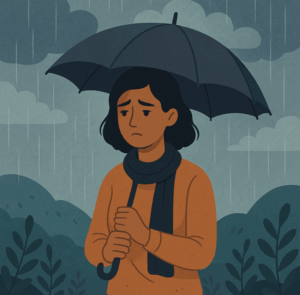Monsoon and Mental Health: When the Rains Bring the Blues
 As a psychiatrist working across outpatient clinics and academic psychiatry, I’ve seen how seasonal patterns can subtly—but powerfully—affect our emotions and mental health. One such overlooked pattern occurs during India’s monsoon months, when the skies turn grey and so do many minds.
As a psychiatrist working across outpatient clinics and academic psychiatry, I’ve seen how seasonal patterns can subtly—but powerfully—affect our emotions and mental health. One such overlooked pattern occurs during India’s monsoon months, when the skies turn grey and so do many minds.
The rains bring much-needed relief from the summer heat. But they can also bring an unexpected slump in mood, energy, sleep, and motivation—especially in those already vulnerable to emotional dysregulation or mood disorders.
🌧️ How Monsoon Affects the Mind
1. Monsoon Blues and Seasonal Depression
-
Reduced sunlight affects serotonin (mood) and melatonin (sleep).
-
Result: fatigue, sadness, cravings for carbs, sleep changes.
-
Similar to Seasonal Affective Disorder (SAD), though typically described in winter regions, a monsoon variant is seen in Indian settings.
2. Disrupted Social Rhythms
-
Isolation due to rains, waterlogging, and power cuts
-
Reduced daily routines → worsened mood in working adults, elderly, and adolescents
3. Anxiety and OCD Exacerbation
-
Fear of contamination, compulsive cleaning rituals
-
Heightened health anxiety and panic attacks triggered by weather unpredictability
4. Neurodevelopmental Disorders
-
Children with ADHD or Autism face disrupted routines, sensory overload (sound, wet textures), and boredom
-
Risk of behavioural outbursts and parental stress
5. Physical and Nutritional Factors
-
Vitamin D deficiency → linked to depressive symptoms
-
Poor gut health during monsoon → fatigue, brain fog
-
Excessive caffeine/sugar intake → worsens anxiety and insomnia
🧭 What You Can Do
☀️ Light Up Your Days
-
Prioritize 20–30 minutes of sunlight exposure daily
-
If low mood persists, ask about light therapy or Vitamin D supplementation
🧘 Stick to a Routine
-
Monsoons disrupt our biological and social clocks
-
Follow a stable sleep-wake-exercise-meal schedule
🧑🤝🧑 Connect, Even if Indoors
-
Combat isolation with regular calls, group video chats, or structured family time
🎯 Move Your Body
-
Indoor walking, yoga, or dancing can re-energize your mind and body
🩺 When to Seek Help
Reach out to a mental health professional if you experience:
-
Persistent low mood for >2 weeks
-
Hopelessness or withdrawal
-
Sleep and appetite disruption
-
Thoughts of self-harm or helplessness
🌈 How We Help
At our clinics in Velachery and Tambaram, we offer evidence-based, personalized care for mood disorders including Seasonal Affective Disorder. One approach we often use is:
✨ IPSRT (Interpersonal and Social Rhythm Therapy)
-
A specialized therapy that helps stabilize daily rhythms (sleep, social contact, activity)
-
Proven to reduce relapse and improve functioning in mood disorders, including SAD
Combined with nutritional support, sleep hygiene, and, where necessary, medications or light therapy, we offer comprehensive care for those affected by seasonal mood changes.
🌦️ Final Words
The monsoon is a time of transformation—for the earth, and perhaps for you. If the rains stir more than just memories… if they bring on fatigue, sadness, or anxiety… know that help is available.
Just like we carry umbrellas when it rains, we all deserve support when the mind feels stormy.
Dr. Srinivas Rajkumar T, M.D. (AIIMS), DNB, MBA (BITS-Pilani)
Consultant Psychiatrist
Velachery , Chennai | www.srinivasaiims.com
📞 85951 55808
Let’s talk. Let’s heal. Let the clouds pass.